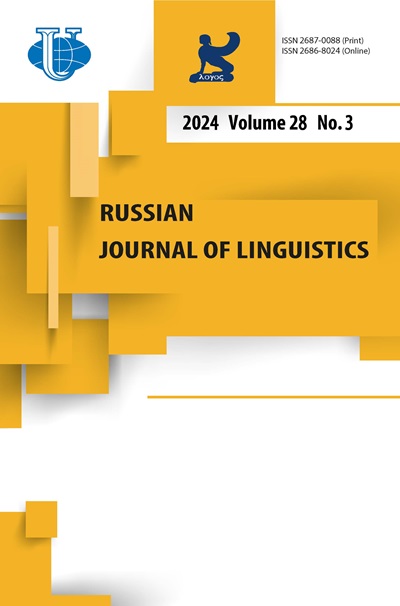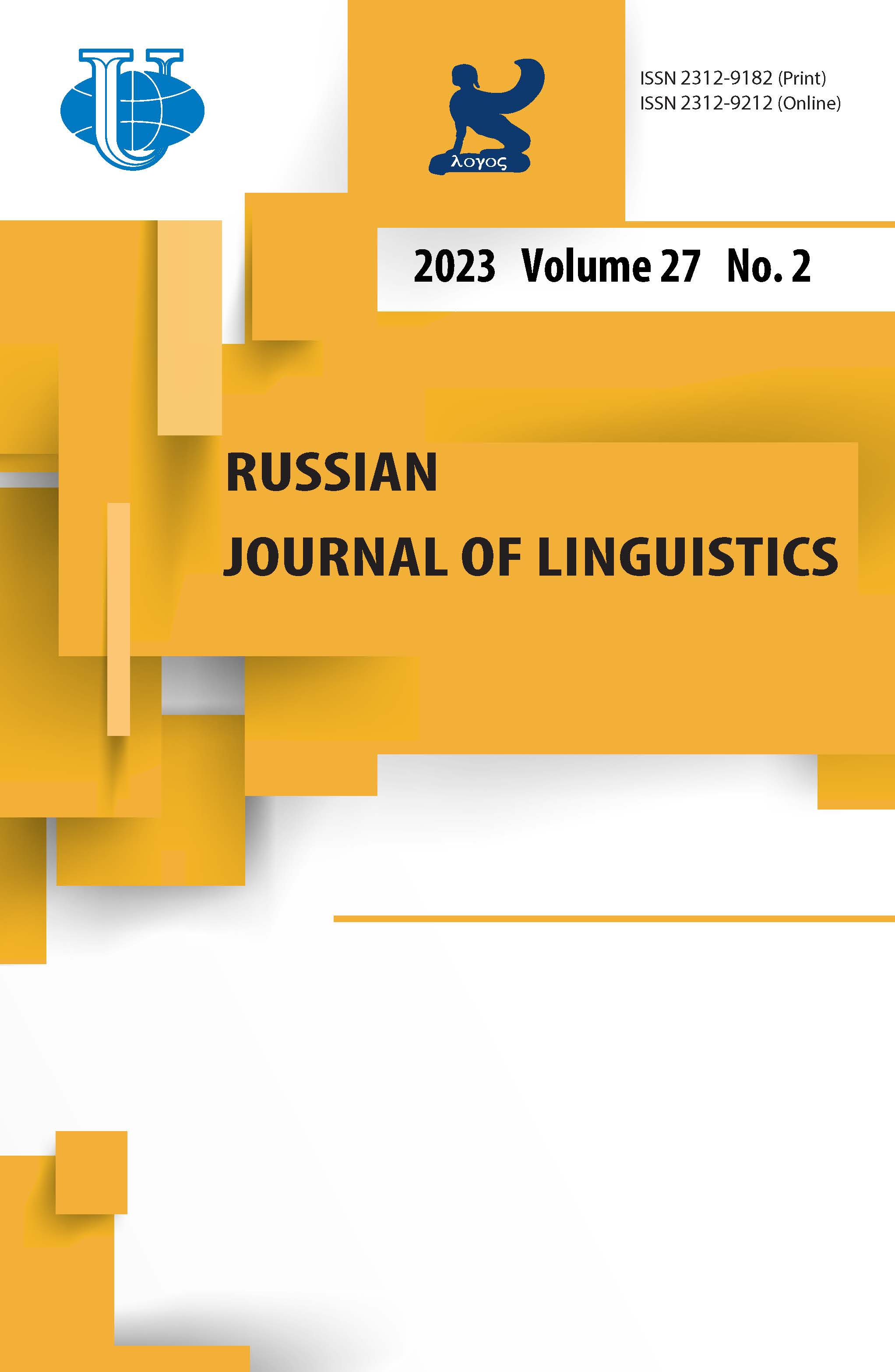Речевые формулы в критических рецензиях на научные статьи по различным дисциплинам
- Авторы: Кашиха Х.1
-
Учреждения:
- Университет Сохар
- Выпуск: Том 27, № 2 (2023)
- Страницы: 251-275
- Раздел: Статьи
- URL: https://journals.rudn.ru/linguistics/article/view/35189
- DOI: https://doi.org/10.22363/2687-0088-34320
- EDN: https://elibrary.ru/JHBMNU
Цитировать
Полный текст
Аннотация
Речевые формулы существенно влияют на устный и письменный дискурс. Эти модели, как правило, различаются в зависимости от жанра и дисциплины. Их изучение в оценочных жанрах, особенно в рамках различных дисциплин, до сих пор было относительно ограниченным. Данное исследование направлено на изучение использования речевых формул в рецензиях на статьи по трем дисциплинам, поданные начинающими иранскими исследователями в международные журналы. На основе дискурсивно-аналитического подхода анализируются частотность использования, структура и функции наиболее распространенных речевых формул, состоящих из четырех слов, в 120 аутентичных рецензиях на статьи по прикладной лингвистике, инженерному делу и бизнесу (40 работ по каждой дисциплине), в которых рекомендуется существенная либо незначительная доработка. В статье исследуется как рецензенты используют эти формулы, чтобы донести свои комментарии до авторов. Результаты показывают различия в использовании, структуре и функциях речевых формул в рецензиях на статьи по разным дисциплинам. Однако отмечаются и общие черты, обусловленные присущими оценочному жанру особенностями. Выявленные тенденции также проявляются в структуре рецензий и стиле комментариев. Исследование способствует пониманию практик оценивания в различных дисциплинах, дает ценную информацию о речевых формулах, используемых в рецензиях, и выделяет шаблонные выражения, используемые представителями конкретных дисциплин в конструктивной обратной связи с автором.
Ключевые слова
Об авторах
Хади Кашиха
Университет Сохар
Автор, ответственный за переписку.
Email: hkashiha@su.edu.om
ORCID iD: 0000-0001-8907-4804
доцент кафедры прикладной лингвистики Университета Сохар в Омане, бывший научный сотрудник Университета Альзахра в Иране. Его исследовательские интересы сосредоточены на корпусной и прикладной лингвистике, в особенности на анализе дискурса, изучении жанров, английском языке для академических целей и прагматике. Он является автором ряда научных статей, опубликованных в высокорейтинговых журналах, в том числе Journal of Pragmatics, Australian Journal of Linguistics, European Journal of Applied Linguistics, Southern African Linguistics and Applied Language Studies и др.
ОманСписок литературы
- Adel, Annelie & Britt Erman. 2012. Recurrent word combinations in academic writing by native and non-native speakers of English: A lexical bundles approach. English for Specific Purposes 31 (2). 81-92.
- Altenberg, Bengt. 1993. Recurrent word combinations in spoken English. In Juian Meldon D’Arcy (ed.), Proceedings of the fifth Nordic association for English studies Conference, 17-27. University of Iceland.
- Becher, Tony. 1994. The significance of disciplinary differences. Studies in Higher Education 19 (2). 151-161.
- Belcher, Diane D. 2007. Seeking acceptance in an English-only research world. Journal of Second Language Writing 16 (1). 1-22.
- Biber, Douglas & Federica Barbieri. 2007. Lexical bundles in university spoken and written registers. English for Specific Purposes 26 (3). 263-286.
- Biber, Douglas & Susan Conrad. 1999. Lexical bundles in conversation and academic prose. Language and Computers 26. 181-190.
- Biber, Douglas, Susan Conrad & Viviana Cortes. 2004. If you look at…: Lexical bundles in university teaching and textbooks. Applied Linguistics 25 (3). 371-405.
- Biber, Douglas, Susan Conrad & Randi Reppen. 1998. Corpus Linguistics: Investigating Language Structure and Use. Cambridge: Cambridge University Press.
- Biber, Douglas, Stig Johansson, Geoffrey Leech, Susan Conrad, Edward Finegan & Randolph Quirk. 1999. Longman Grammar of Spoken and Written English. Longman.
- Breeze, Ruth. 2013. Lexical bundles across four legal genres. International Journal of Corpus Linguistics 18 (2). 229-253. https://doi.org/10.1075/ijcl.18.2.03bre
- Chan, Swee Heng, Hadi Kashiha & Helen Tan. 2014. Lexical bundles: Facilitating University “Talk” in group discussions. English Language Teaching 7 (4). 1-10. https://doi.org/10.5539/elt.v7n4p1
- Chen, Yu-Hua & Paul Baker. 2010. Lexical bundles in L1 and L2 academic writing. Language Learning and Technology 14 (2). 30-49.
- Cortes, Viviana. 2004. Lexical bundles in published and student disciplinary writing: Examples from history and biology. English for Specific Purposes 23 (4). 397-423.
- Cortes, Viviana. 2006. Teaching lexical bundles in the disciplines: An example from a writing intensive history class. Linguistics and Education 17 (4). 391-406. https://doi.org/10.1016/j.linged.2007.02.001
- Grabowski, Łukasz. 2015. Keywords and lexical bundles within English pharmaceutical discourse: A corpus-driven description. English for Specific Purposes 38. 23-33. https://doi.org/10.1016/j.esp.2014.10.004
- Curzon, M. E. J. & R. E. Cleaton-Jones. 2011. Reviewing scientific manuscripts. European Archives of Paediatric Dentistry 12 (4). 184-187.
- Herbel-Eisenmann, Beth, David Wagner & Viviana Cortes. 2010. Lexical bundle analysis in mathematics classroom discourse: The significance of stance. Educational Studies in Mathematics 75 (1) 23-42. https://doi.org/10.1007/s10649-010-9253-6
- Howarth, Peter. 1998. Phraseology and second language proficiency. Applied Linguistics 19 (1). 24-44. https://doi.org/10.1093/applin/19.1.24
- Hyland, Ken. 2008. As can be seen: Lexical bundles and disciplinary variation. English for Specific Purposes 27 (1). 4-21. https://doi.org/10.1016/j.esp.2007.06. 001.
- Jeong, Hyojin & Nan Jiang. 2019. Representation and processing of lexical bundles: Evidence from word monitoring. System 80. 188-198. https://doi.org/10.1016/j.system. 2018.11.009
- Karabacak, Erkan & Jingjing Qin. 2013. Comparison of lexical bundles used by Turkish, Chinese, and American university students. Procedia-Social and Behavioral Sciences 70. 622-628.
- Kashiha, Hadi. 2015. Recurrent formulas and moves in writing research article conclusions among native and nonnative writers. The Southeast Asian Journal of English Language Studies 21 (1). 47-59. http://dx.doi.org/10.17576/3L-2015-2101-05
- Kashiha, Hadi & Chan Swee Heng. 2013. An exploration of lexical bundles in academic lectures: Examples from hard and soft sciences. The Journal of Asia TEFL 10 (4). 133-161.
- Kashiha, Hadi & Chan Swee Heng. 2014a. Discourse functions of formulaic sequences in academic speech across two disciplines. GEMA Online™ Journal of Language Studies 14 (2). 15-27. http://dx.doi.org/10.17576/GEMA-2014-1402-02
- Kashiha, Hadi & Chan Swee Heng. 2014b. Structural analysis of lexical bundles in university lectures of politics and chemistry. International Journal of Applied Linguistics and English Literature 3 (1). 224-230. http://dx.doi.org/10.7575/aiac.ijalel.v.3n.1p.224
- Kashiha, Hadi & Chan Swee Heng. 2014c. Cross-linguistic and cross-disciplinary investigation of lexical bundles in academic writing. Pertanika: Journal of Social Science and Humanities 22 (4). 937-951.
- Kashiha, Hadi & Chan Swee Heng. 2015. A little bit about: Differences in native and non-native speakers’ use of formulaic language. Australian Journal of Linguistics 35 (4). 297-310. https://doi.org/10.1080/07268602.2015.1067132
- Larina, Tatiana & Douglas Mark Ponton. 2020. Tact or frankness in English and Russian blind peer reviews. Intercultural Pragmatics 17 (4). 471-496. https://doi.org/10.1515/ip-2020-4004
- Larina, Tatiana & Douglas Mark Ponton. 2022. I wanted to honour your journal, and you spat in my face: Emotive (im)politeness and face in the English and Russian blind peer review. Journal of Politeness Research 18 (1). 201-226. https://doi.org/10.1515/pr-2019-0035
- Loonen, Martijn PJ, J. Joris Hage & Moshe Kon. 2005. Who benefits from peer review? An analysis of the outcome of 100 requests for review by Plastic and Reconstructive Surgery. Plastic and Reconstructive Surgery 116 (5). 1461-1472.
- Meunier, Fanny & Sylviane Granger. 2008. Phraseology in Foreign Language Learning and Teaching. John Benjamins Publishing Company. https://doi.org/10.1075/z.138
- Mungra, Philippa & Pauline Webber. 2010. Peer review process in medical research publications: Language and content comments. English for Specific Purposes 29 (1). 43-53.
- Nekrasova, Tatiana M. 2009. English L1 and L2 speakers’ knowledge of lexical bundles. Language Learning 59 (3). 647-686. https://doi.org/10.1111/j.1467-9922.2009.00520.x
- Paltridge, Brian. 2017. The Discourse of Peer Review: Reviewing Submissions to Academic Journals. London: Palgrave Macmillan. https://doi.org/10.1057/978-1-137-48736-0
- Paltridge, Brian. 2019. Looking inside the world of peer review: Implications for graduate student writers. Language Teaching 52 (3). 331-342. https://doi.org/10.1017/S0261444818000150
- Paltridge, Brian. 2020. Engagement and reviewers’ reports on submissions to academic journals. Journal of English for Research Publication Purposes 1 (1). 4-27.
- Pan, Fan & Chen Liu. 2019. Comparing L1-L2 differences in lexical bundles in student and expert writing. Southern African Linguistics and Applied Language Studies 37 (2). 142-157. https://doi.org/10.2989/16073614.2019.1625276
- Pawley, Andrew & Frances Hodgetts Syder. 1983. Two puzzles for linguistic theory: Nativelike selection and nativelike fluency. In Jack C. Richards & Richard W. Schmidt (eds.), Language and communication, 191-225. Longman.
- Reppen, Randi & Shannon B. Olson. 2020. Lexical bundles across disciplines: A look at consistency and variability. In Ute Romer, Viviana Cortes & Eric Friginal (eds.), Advances in corpus-based research on academic writing: Effects of discipline, register, and writer expertise, 170-182. John Benjamins Publishing Company. https://doi.org/10.1075/scl.95.07rep
- Salazar, Danica. 2014. Lexical Bundles in Native and Non-native Scientific Writing: Applying a Corpus-based Study to Language Teaching. John Benjamins Publishing Company. https://doi.org/10.1075/scl.65
- Samraj, Betty. 2016. Discourse structure and variation in manuscript reviews: Implications for genre categorization. English for Specific Purposes 42. 76-88
- Schmitt, Norbert, Sarah Grandage & Svenja Adolphs. 2004. Are corpus-derived recurrent clusters psycholinguistically valid? In Norbert Schmitt (ed.), Formulaic sequences. Acquisition, processing and use, 127-152. John Benjamins Publishing Company. https://doi.org/10.1075/lllt.9.08sch
- Scott, Mike. 2008. Wordsmith Tools 4. Oxford University Press
- Shin, Yu Kyoung. 2019. Do native writers always have a head start over nonnative writers? The use of lexical bundles in college students’ essays. Journal of English for Academic Purposes 40. 1-14. https://doi.org/10.1016/j.jeap.2019.04.004
- Shirazizadeh, Mohsen & Rojan Amirfazlian. 2021. Lexical bundles in theses, articles and textbooks of applied linguistics: Investigating intradisciplinary uniformity and variation. Journal of English for Academic Purposes 49. 100946. https://doi.org/10.1016/j.jeap.2020.100946
- Sinclair, John. 1991. Corpus, Concordance, Collocation. Oxford University Press.
- Swales, John M. 1990. Genre Analysis: English in Academic and Research Settings. Cambridge: Cambridge University Press.
- Swales, John M. 1996. Occluded genres in the academy. In Eija Ventola & Anna Mauranen (eds.), Academic writing, 45-58. Amsterdam: John Benjamins.
- Tremblay, Antoine, Bruce Derwing, Gary Libben & Chris Westbury. 2011. Processing advantages of lexical bundles: Evidence from self-paced reading and sentence recall tasks. Language Learning 61 (2). 569-613.
- Wei, Yaoyu & Lei Lei. 2011. Lexical bundles in the academic writing of advanced Chinese EFL learners. RELC Journal 42 (2). 155-166. https://doi.org/10.1177/0033688211407295
- Wray, Alison. 2013. Formulaic language. Language Teaching 46 (3). 316-334. https://doi.org/10.1017/S0261444813000013

















